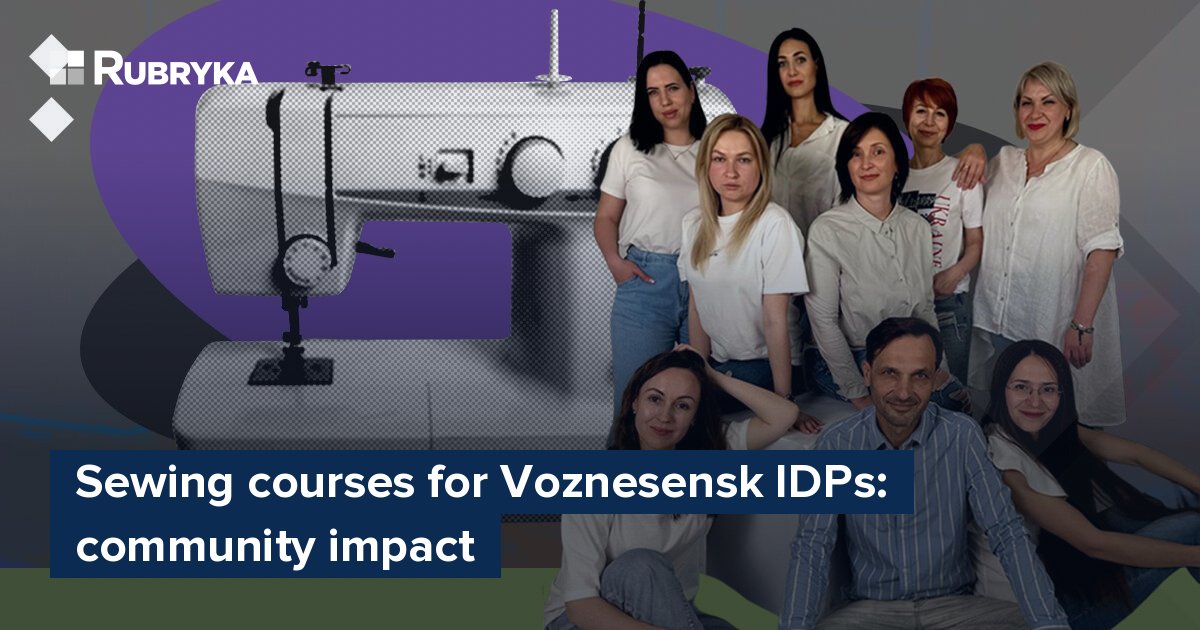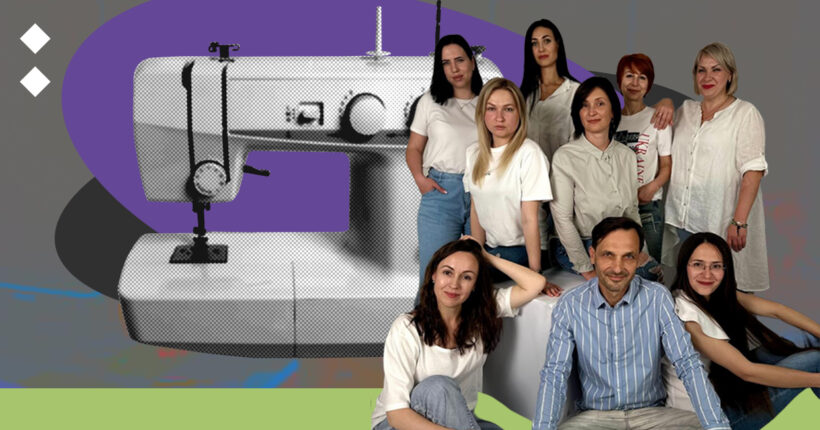
What is the problem?
In the Voznesensk community in the Mykolaiv region, IDPs make up 10% of the community's population. Out of over 3,500 displaced people, 2,109 are working-age women who lost their jobs due to the war.
According to Yuliia Dragneva, head of the Voznesensk Community Foundation, showed that these women are eager to learn new skills through informal education. They expressed interest in various fields, including cooking, IT, social media management, photography, tailoring, design, handmade crafts, accounting, and entrepreneurship.
However, the study also highlighted several barriers: the need to travel to other communities for education, the long duration and high cost of training courses, and inconvenient class times.
Simultaneously, there was a shortage of qualified workers in the local garment industry.
What is the solution?
To address these issues, the Voznesensk Community Foundation launched free sewing skills training for resettled women through the newly established Adult Education Center in 2023. This three-month project aims to enhance the educational level and professional qualifications of IDP women and those from vulnerable groups.
How does it work?
Center of informal education was created in Voznesensk
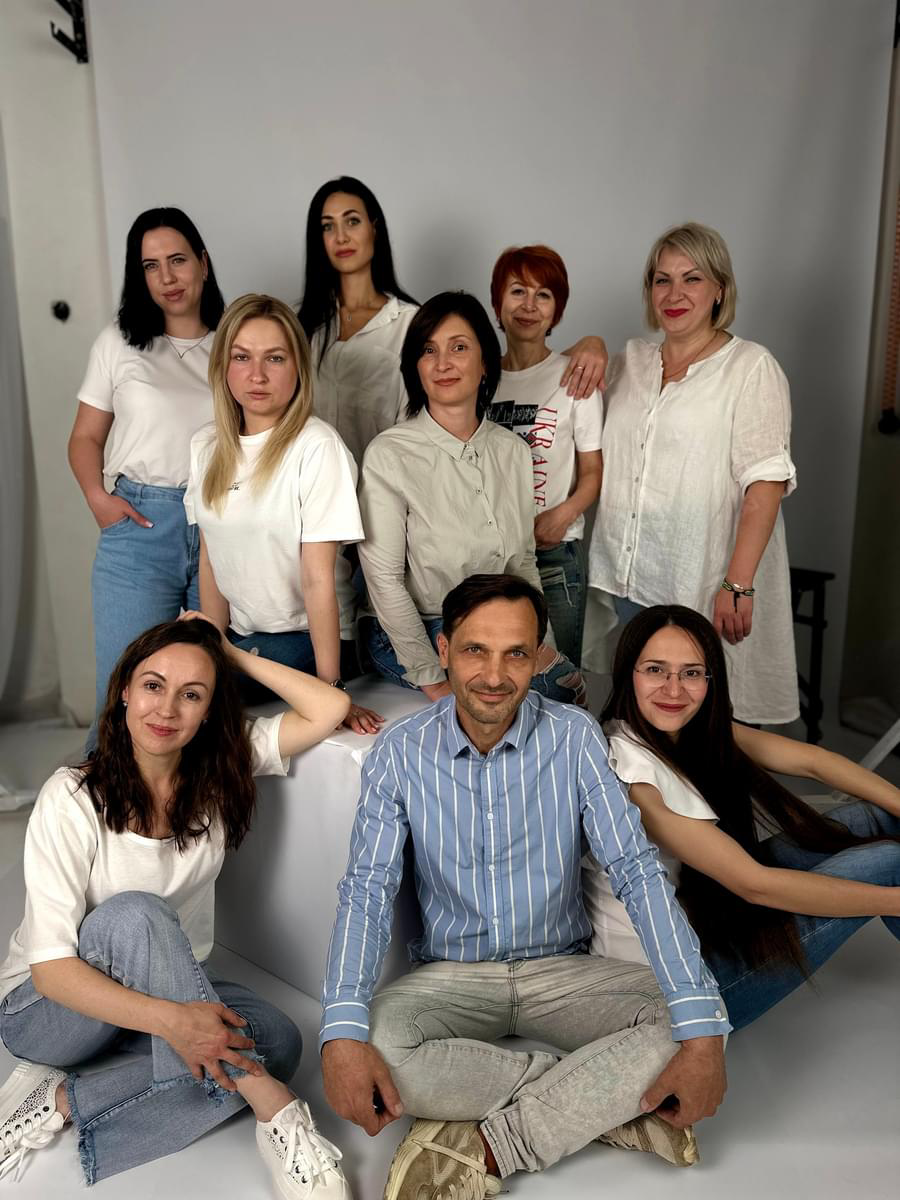
The team of the Adult Education Center. Photo from the fund's archive
Voznesensk community is a hub of textile production, with seven sewing factories and three workshops facing staff shortages due to the outflow of former female employees who have moved abroad because of hostilities. "The current local college that trains seamstresses has an outdated education system, low-quality equipment, and a lengthy three-year training process, mostly catering to young people," explains Viktoriia Baltser, a board member of the Voznesensk Community Foundation.
Thus, the community faced a dual challenge: a pressing need for seamstresses to support local production and a strong desire among women, including IDPs, to quickly learn a new trade and secure employment.
To address this, the creation of an educational sewing workshop began with finding a suitable location. The city council offered the building of a former boarding school canteen, which required renovation. Authorities allocated over $24 thousand to fund repairs on part of the premises.
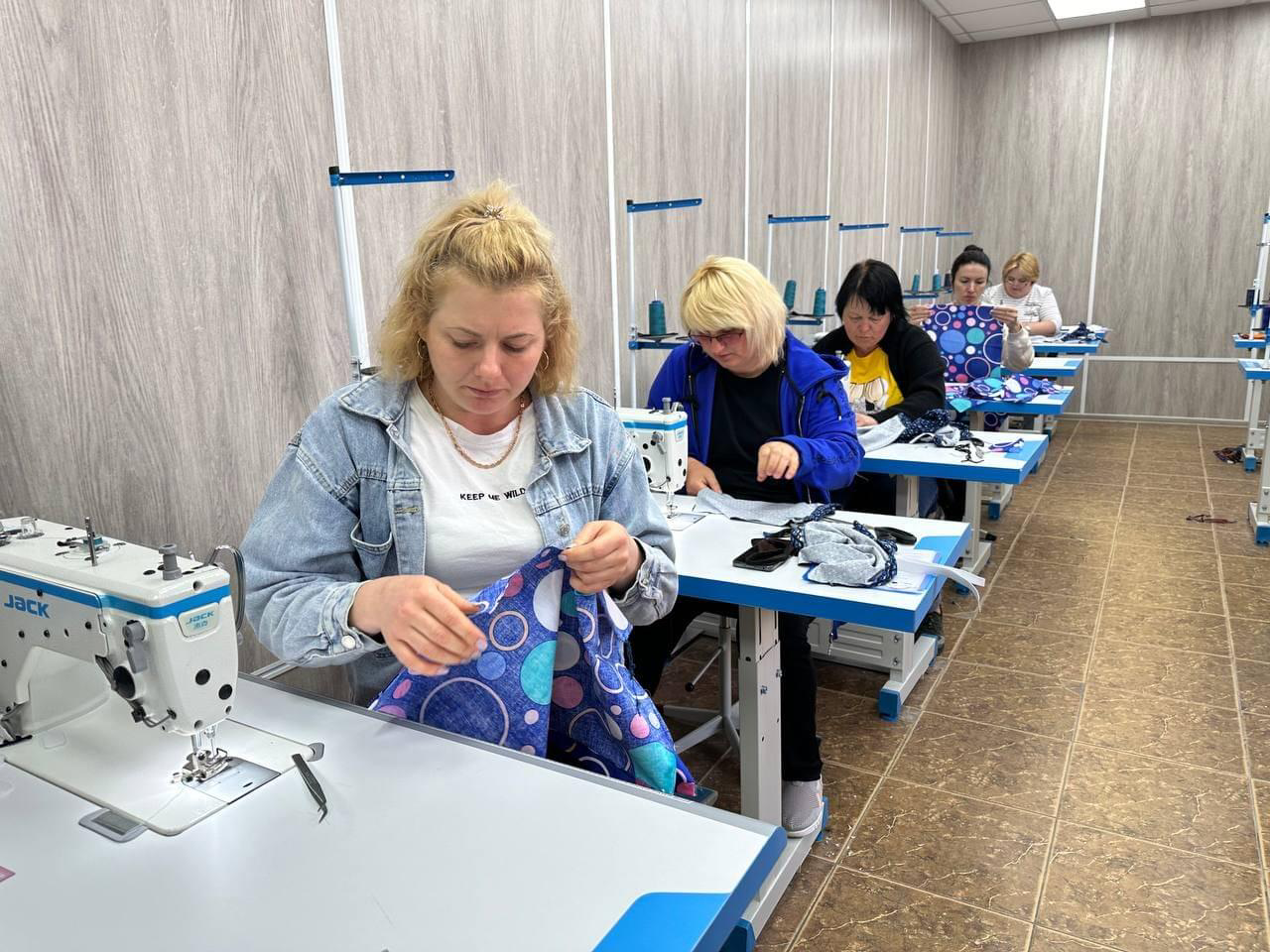
Classes in the Sewing Business course. Photo from the fund's archive
The next step was to bring in local sewing expert Tetiana Drach, a technologist in the light industry. Together with the foundation's specialists, she developed the core "Sewing Business" course and identified the essential equipment needed for the eight training stations: eight sewing machines, one coverstitch machine, two overlocks, a steam generator, a large cutting table, and other tools.
The Adult Education Center, which hosted the project, secured grants and contributions from seven donors, totaling $1,388 million.
Why and how they teach sewing skills courses
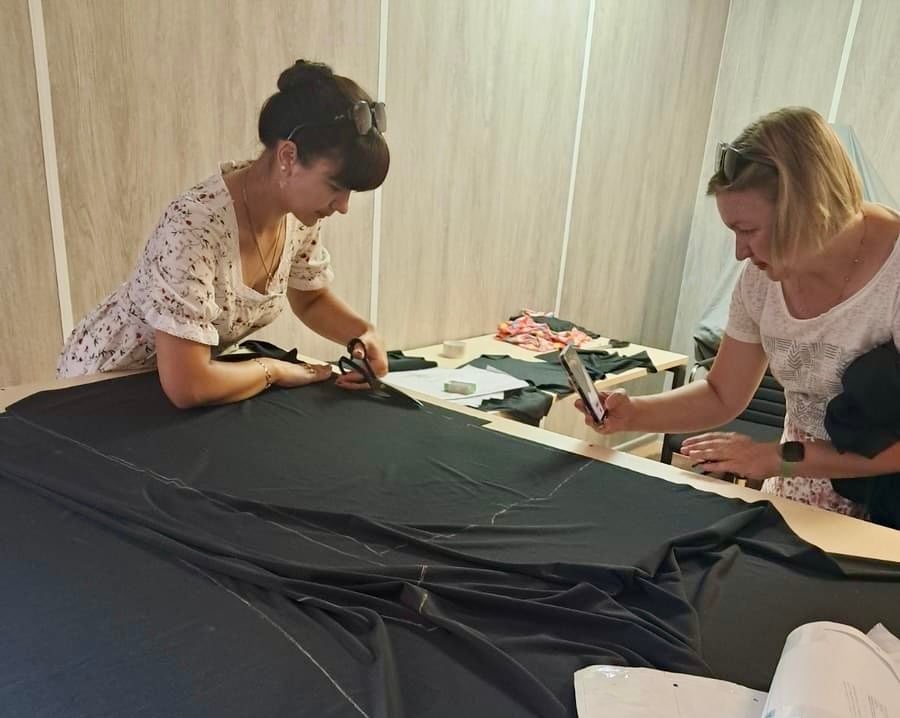
Cutting process. Photo from the fund's archive
The seamstress training program is a three-month course tailored to support women from various vulnerable backgrounds. The project specifically targets mothers with many children, women from low-income families, single mothers, women on maternity leave, pensioners, and IDPs.
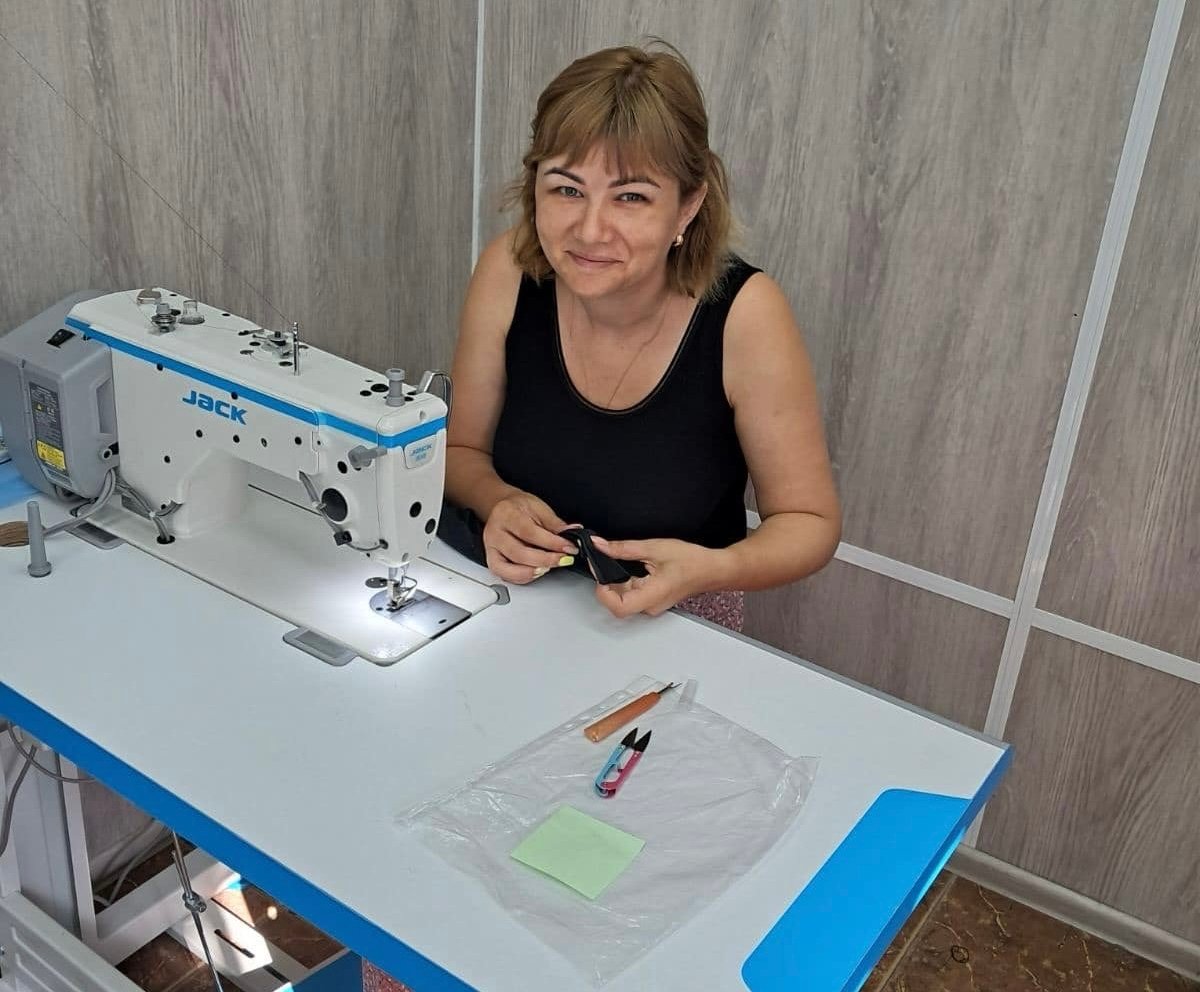
Halyna Sekker, an environmentalist by profession, joined the sewing courses to learn the basics of sewing. Now, in addition to her environmental work, she can create unique, eco-friendly items by hand. She also inspires her 7-year-old daughter, who dreams of becoming a fashion designer, to believe in her dreams and explore her own potential. Photo from the heroine's archive
The demand for the sewing courses was high, with 10 applicants for each spot, leading the organizers to create a waiting list. Classes for the first two groups of the "Sewing Business" course began in early April.
"The participants immersed themselves in the learning process at full speed. Under the careful guidance of Tetiana Drach, they quickly sewed their first items and proudly took them home," says Viktoriia Baltser.
Just two and a half months later, the course graduates—including two young men who joined to develop their own clothing brands—presented their hand-sewn clothes as their final projects. These garments were donated to a local hospital.
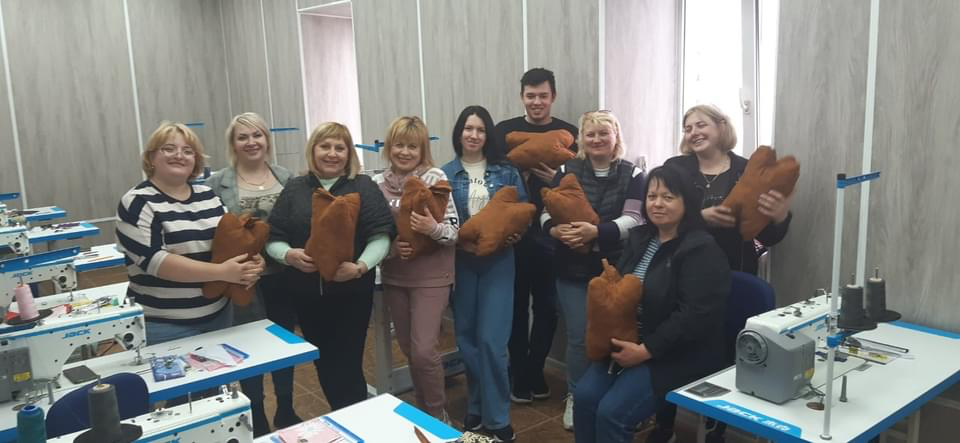
During their first lesson in the Sewing Busines" course, the students successfully sewed a pillow on their own. Photo from the fund's archive
"For the girls to be confident in themselves"
Course instructor Tetiana Drach noted that most of her students had never used a sewing machine before, and some didn't even know where the pedal was. The success of both the mentor and her students lies in an informal approach to teaching and learning.
"I don't focus on perfection. I want the girls to achieve results quickly, even if it means making mistakes along the way. Sometimes, I even help them get there faster. When they see the finished product—something that can be hard for beginners to visualize during the process—their eyes light up. They get excited and want to try more! My primary goal is for the girls to gain confidence in themselves, to quickly realize that they can create something, and then, gradually, they'll master everything else," says Drach.
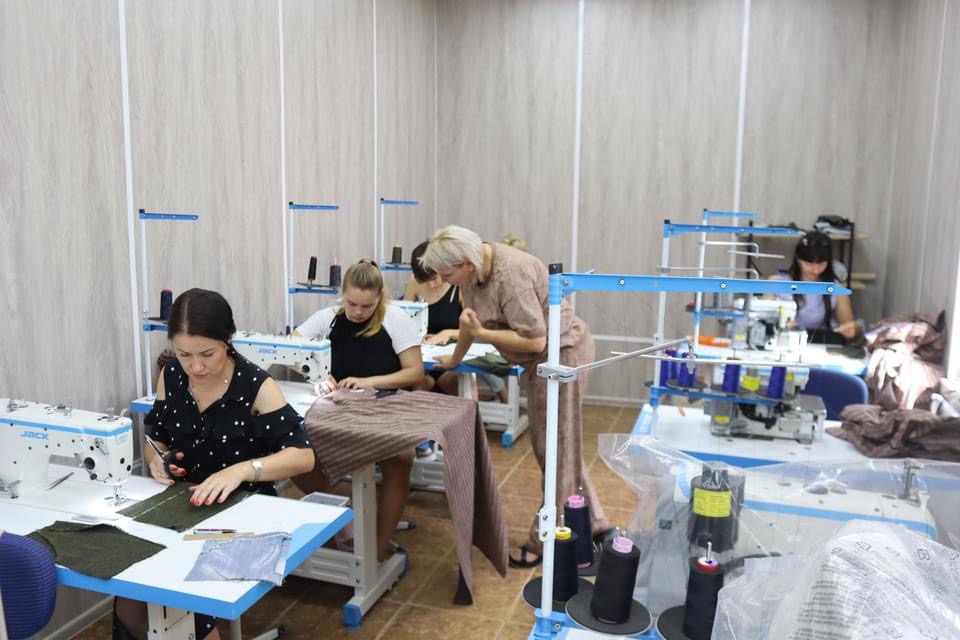
Tetyana Drach assists a student. Photo from the fund's archive
Tetiana Drach, who has been sewing for about 20 years, continues to learn and refine her craft. She eagerly shares her wealth of knowledge with her students, offering both traditional professional techniques and practical life hacks that aren't found in any book.
By uncovering the inner potential of each program participant, Drach teaches more than just the basics of cutting and the sequence of technological operations. She also covers how to choose the right materials and tools, where to find essential information, how to properly care for clothes, and how to minimize fabric waste after sewing. She helps students discover their individual work style and understand how the skills they acquire can translate into additional income.
She emphasizes the importance of building connections during the course. Many of the students had spent one or two years at home, not knowing anyone in the city. The training not only teaches them sewing but also helps them build relationships, make friends, and even start going out for coffee together.
Does it really work?
As of early August, two full groups have completed the "Sewing Business" course, with four more groups nearing graduation. Rubryka asked the course participants what the training had offered them.
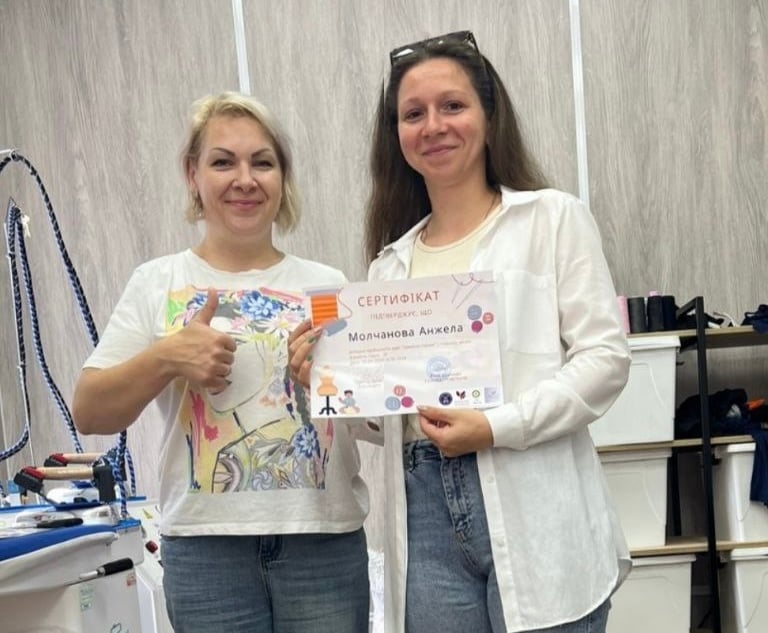
A graduate of the "Sewing Business" course Andzhela Molchanova with teacher Tetiana Drach. Photo from the heroine's archive
Andzhela Molchanova, a migrant from Dnipro, is a doctor by education. She was on maternity leave and now works part-time. Molchanova heard about the sewing courses through acquaintances and decided to give them a try, as she had some free time and wanted to spend it productively.
"I really enjoyed the courses—the atmosphere was pleasant, light, and friendly, with a wonderful teacher who is always ready to help and advise (on sewing and beyond), and modern equipment. The courses were beneficial not only professionally but also morally and socially. The war is hard on all of us, and at the courses, we study, relax a bit, socialize, and distract ourselves," the student shares.
After completing the basic program, Molchanova decided to continue her education and began learning how to sew children's clothes.
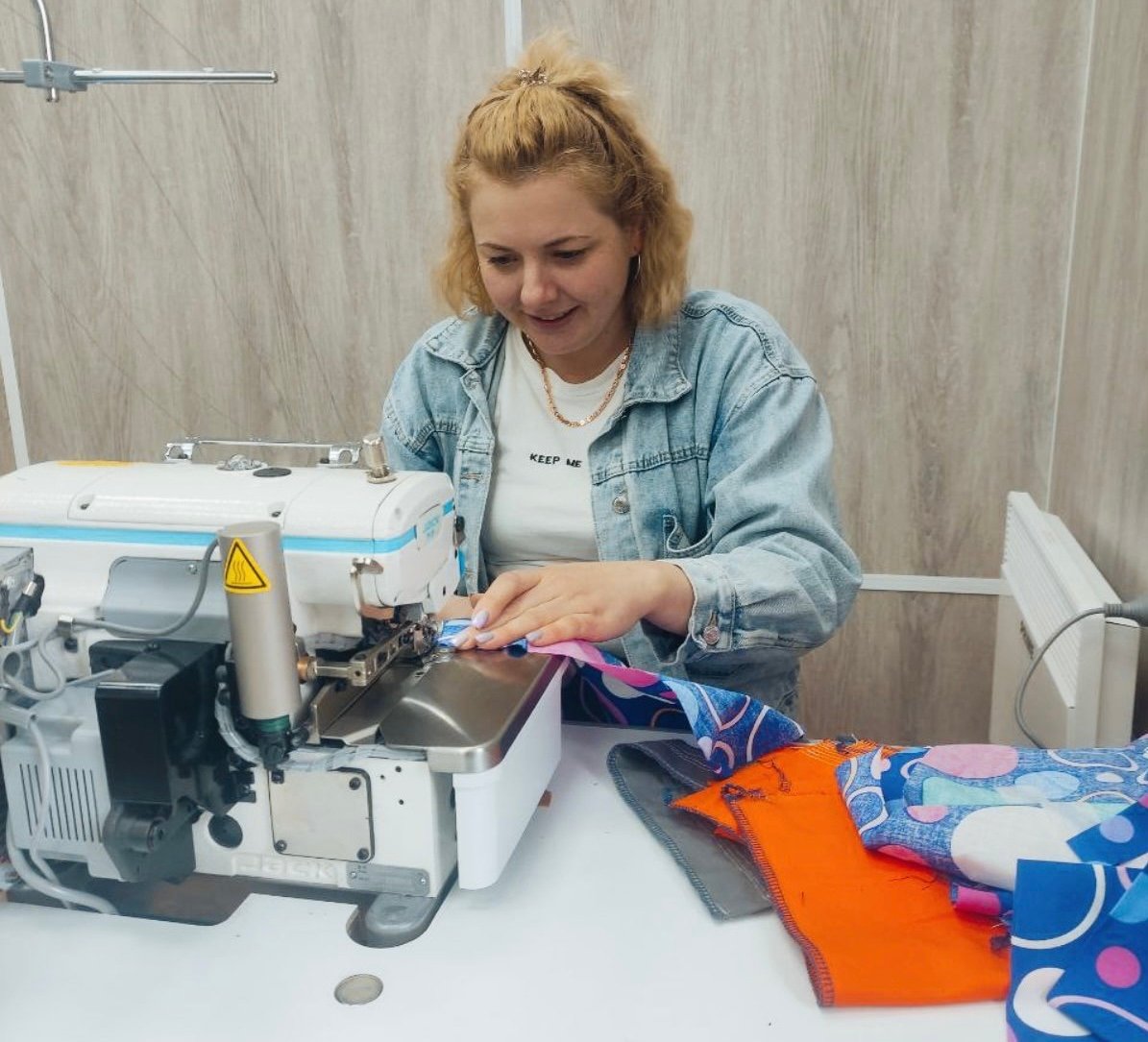
Yuliia Guzenko masters the overlock. Photo from the heroine's archive
Yuliia Guzenko, a psychologist at the inclusive resource center in Voznesensk with over 10 years of teaching experience, joined the sewing courses to learn something new.
"For someone who had never used a professional sewing machine before, I found great joy in creating something with my own hands! It was especially rewarding that the items we made—like special pillows and adaptive underwear—were donated to the hospital. This added extra motivation to my studies. In moments like these, you realize that you can help the defenders, even if just a little," the student shares.
Though Guzenko doesn't plan to change her profession, she values the experience and knowledge she gained from the courses, which she now applies in her daily life. She finds her work as a psychologist, helping people overcome negative situations, to be her true calling.
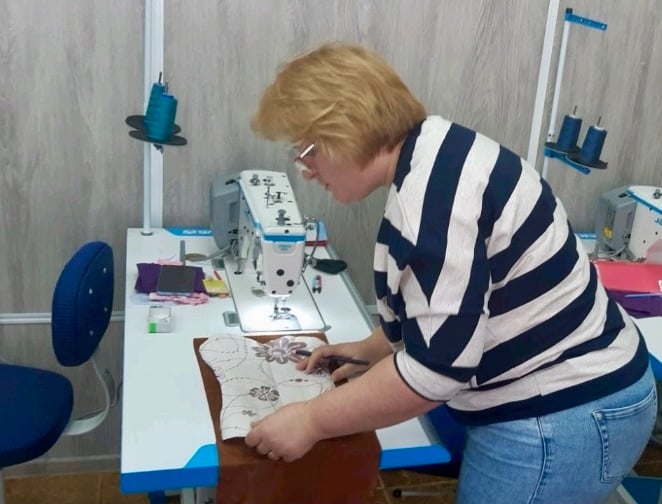
Larysa Karaush cuts a pillow part. Photo from the heroine's archive
Larysa Karaush, a teacher at a rural school in the Voznesensk district, found solace in sewing during a challenging time. Since the war began, she has been teaching online, which she describes as physically and psychologically exhausting. Before joining the sewing course, Karaush sewed intuitively, without formal experience.
"I learned so many interesting sewing secrets that now help me create. The atmosphere in the course was very friendly, with a group of people who were all interesting and had a great sense of humor. Personally, I attended the course not just to learn to sew but also to connect with people. It provided the psychological support I needed at that time," Karaush shares.
The new experience has sparked many creative projects for Karaush. The course not only supported her emotionally but also opened new opportunities. When her school learned she had completed the sewing course, they promised her additional hours for a sewing club starting in the new school year, providing Karaush with extra income.
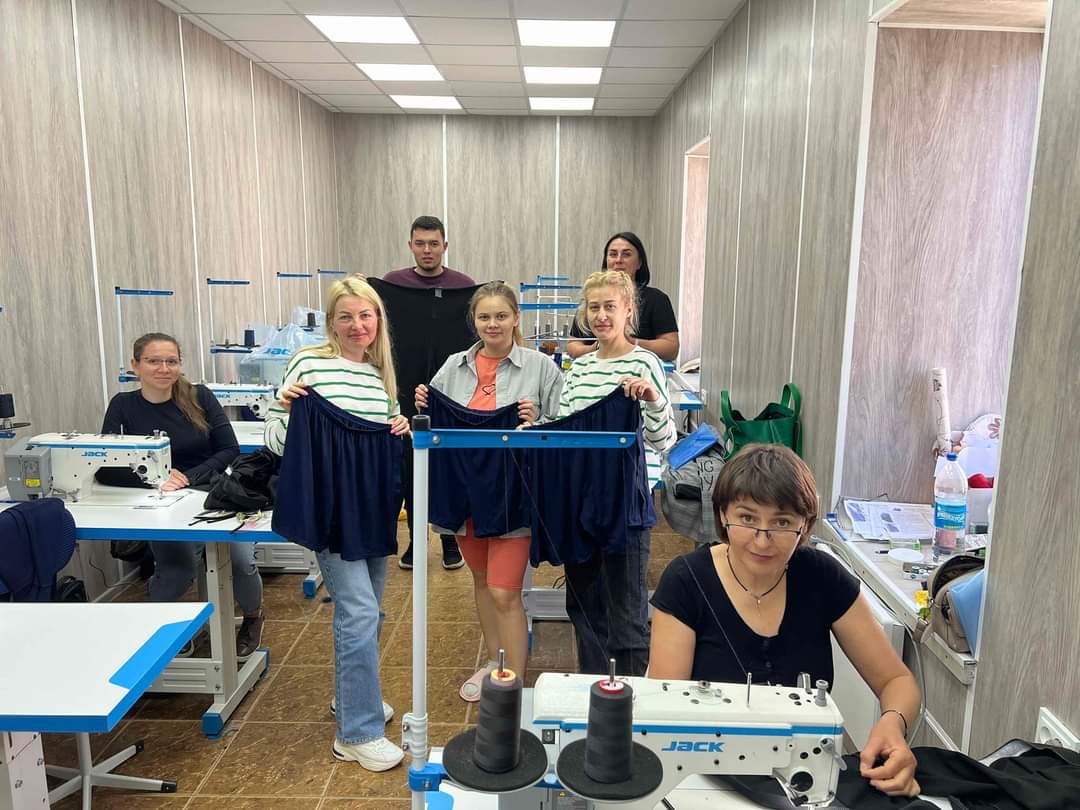
Women show off adaptive underwear made for the hospital. Photo from Alla Salova's archive
When Russia's full-scale invasion began, Alla Salova from Mykolaiv was forced to leave her home and beloved job, embarking on a long journey across Ukraine to protect her family from Russian shelling.
Salova had some sewing experience, being self-taught. During the COVID-19 pandemic, she even attempted to start a small mask-sewing business, which she humorously notes ended when the quarantine did. Her motivation for joining the course was to learn something new, acquire skills different from her main occupation, and meet new people.
She was pleased to learn how to use professional equipment during the course, mastering an overlock, sewing machine, and professional iron. She improved her sewing skills, learned proper cutting techniques, and picked up many other valuable tips.
"I am very grateful to our course instructor, Tetiana Drach, for the knowledge she shared. She is such a positive, professional, and creative person that every lesson was interesting—just a little ray of sunshine, as my son would say. I haven't decided yet if this will become my new profession. For now, I use the skills I've learned for myself and my family, but I'm sure that for some, these courses will truly be the start of something new," says Salova.
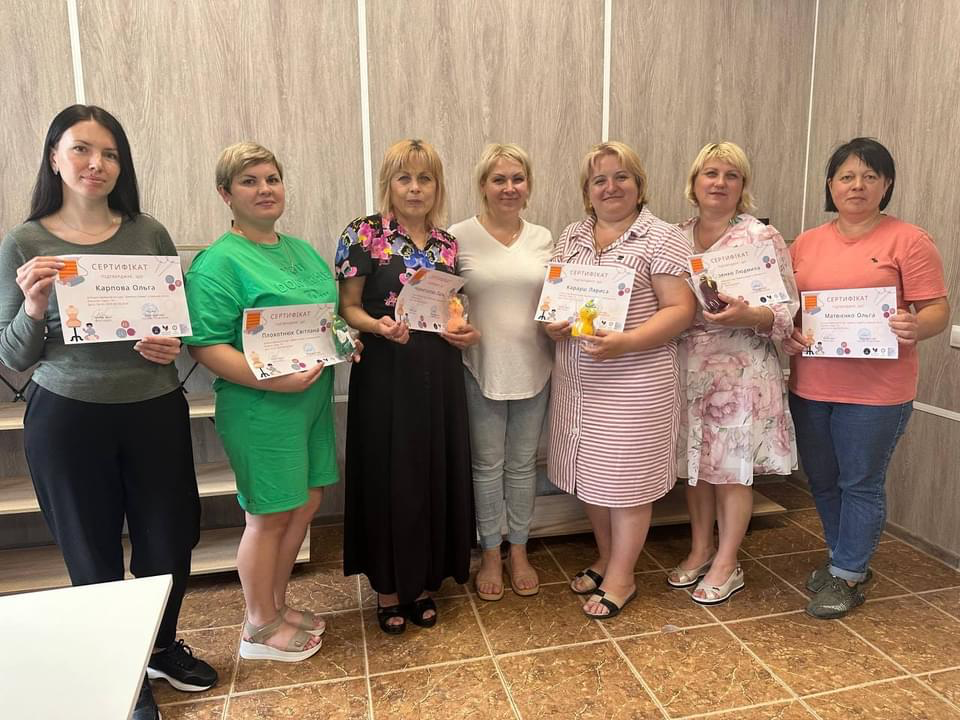
The first class of the "Sewing Business" courses. Photo from the fund's archive
Each of the participants speaks with enthusiasm about the course, describing the informal classes as comfortable and friendly—almost like being at home. There was no divide between students and the teacher. For many, Drach became not just an instructor but also a friend, and for some, even a psychologist who could listen, console, and offer advice with care.
For these women, the training provided more than just professional education; it brought inspiration, communication, a sense of unity, and psychological relief.
Even more useful solutions!
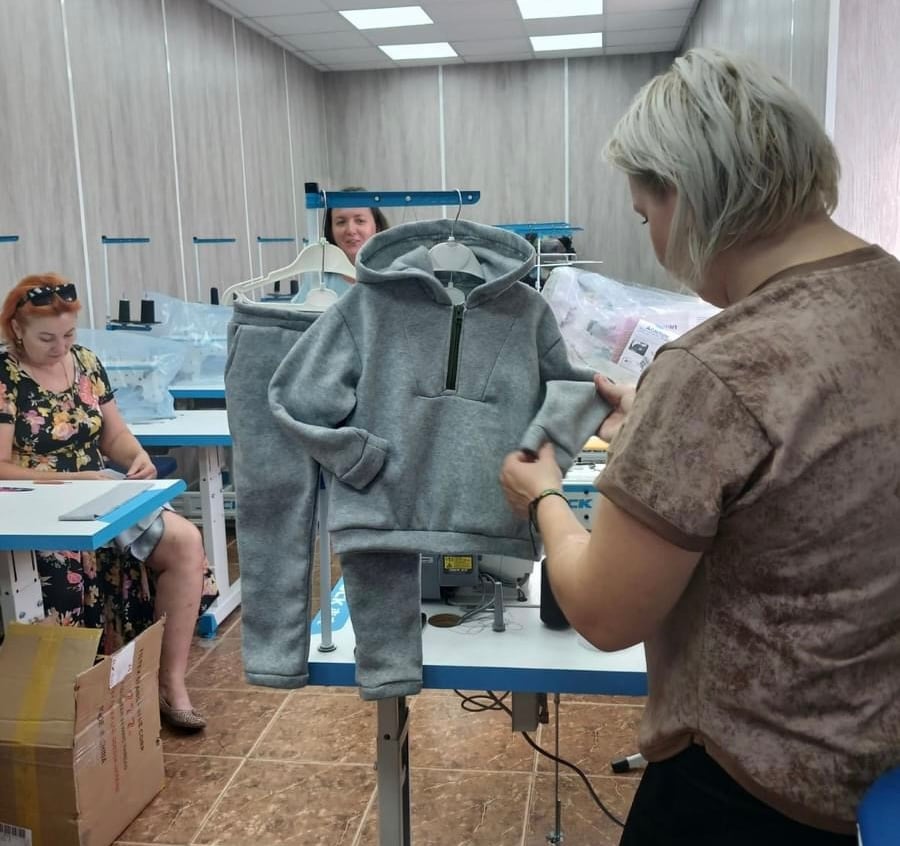
One of the training stages is a course on tailoring children's clothes. Photo from the fund's archive
The Voznesensk Community Foundation views the positive feedback from participants as a strong incentive to continue their work. They are particularly pleased that some graduates have already secured jobs at local sewing enterprises, while others have launched their own businesses using their new skills.
Local businesses have actively supported the project by assisting with training, maintaining equipment, and helping graduates find employment. The products made during the courses are donated to local facilities, adding value to the community.
The Adult Education Center, which exemplifies how local community initiatives can effectively address socio-economic challenges, continues to grow and evolve. It offers new opportunities for the development and integration of vulnerable population groups. The Center envisions creating a sewing hub where any resident of Voznesensk can come to work, volunteer, or learn new skills. In addition to sewing courses, the Center has introduced training in other fields such as baking, barista skills, photography, and SMM (social media marketing). Future plans include courses in pottery, carpentry, and public workshops. They are also working on developing partnerships with other communities to share experiences and resources.
"It seems to me that this process is endless because we see a very large demand from the community," says Viktoria Baltser, a board member of the Voznesensk Community Foundation. "I would even say that skills are secondary. Today, we are building a new community with shared values and culture. These are people who are not afraid to try something new, not afraid to change. People who believe that they can succeed."


